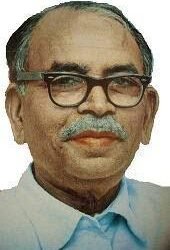Balraj Sahni’s life is a remarkable tale of passion, resilience, and boundless creativity—a true inspiring story of Balraj Sahni that continues to touch hearts across generations. From his humble beginnings in Rawalpindi to being honored as a stalwart of Indian cinema, Sahni’s journey illustrates the power of dreams, persistence, and unwavering belief.
Early Life & Background
The early life of Balraj Sahni began in Rawalpindi, Punjab, British India, on May 1, 1913. Born as Yudhishthir Sahni to a progressive Arya Samaji family, his upbringing was steeped in ideals of reform and social justice. Sahni’s father advocated for the Arya Samaj—a movement emphasizing humanism, education, and the independence struggle, planting seeds of idealism in young Balraj. Sahni’s educational journey was equally impressive; he earned master’s degrees in both English and Hindi from Government College, Lahore, and Gordon College, Rawalpindi.

Early exposure to thinkers like Gandhi and Tagore at Shantiniketan heightened his intellectual curiosity and solidified his worldview. His marriage to Damayanti brought companionship and marked a period where the two taught English and Hindi at Visva-Bharati University in Bengal. During this time, Sahni even collaborated with Gandhi, working at the editorial staff of their newspaper “Nai Talim,” and later traveled with his family to London to serve as a Hindi broadcaster at BBC. These formative experiences—of literature, activism, and multicultural perspectives—would profoundly shape the Balraj Sahni biography and ignite his creative ambitions.
Entry into the Entertainment Industry
Despite Sahni’s academic merits and early career in teaching, his heart yearned for artistic expression. He was drawn to the vibrant world of theater, connecting with the leftist Indian People’s Theatre Association (IPTA), where he honed his craft amidst passionate idealists and storytellers. His journey into films began with struggle. After an abortive attempt to join Calcutta’s New Theatres, Sahni persisted and eventually debuted as an actor in the film “Insaaf” (1946). He experienced heartbreak—in 1947 his wife Damayanti died tragically.
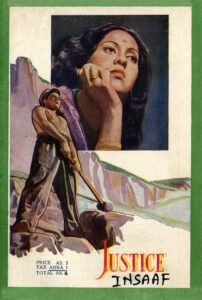
Her untimely death left Sahni shattered, but he channeled his grief into his artistic pursuits and became active with the Communist Party, working closely with slum dwellers and embracing Marxist philosophy. Balraj Sahni’s struggles and early encounters deeply influenced the humanistic sensitivity that would define his career journey.
Career Journey & Major Turning Points
Sahni’s career journey gained momentum with “Dharti Ke Lal” (1946), but it was “Do Bigha Zamin” (1953) that marked his breakthrough. Playing Shambhu Mahato, a poor farmer fighting for survival, Sahni’s nuanced performance won international acclaim—including the International Prize at the Cannes Film Festival (1954). He brought extraordinary realism to his roles—able to empathize with the common man’s struggles. To prepare for “Do Bigha Zamin,” Sahni immersed himself in the world of rickshaw pullers, spending days physically pulling a rickshaw in Kolkata’s summer heat for authenticity.
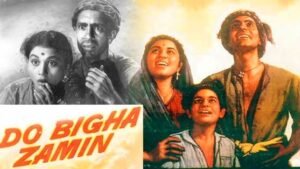
Over eight decades, his filmography blossomed with classics: “Hum Log” (1951), “Kabuliwala” (1961), “Waqt” (1965), “Neel Kamal” (1968), “Chhoti Bahen” (1959), and “Garm Hava” (1973). His roles reflected social realities, often portraying ordinary people with dignity and compassion. Collaborations with filmmakers like Bimal Roy, Guru Dutt, and Yash Chopra cemented his legacy as a pioneer of cinematic realism. Sahni’s major turning points weren’t just about box office success—they were moments of empathy, learning, and artistic evolution.
Achievements & Recognition
The achievements of Balraj Sahni are abundant and illustrious. He received the prestigious Padma Shri in 1969, a testament to his contribution to Indian arts and culture. Sahni’s portrayal in “Do Bigha Zamin” not only won awards but also influenced generations of actors and filmmakers. He was honored with a Filmfare Special Award in 1970.
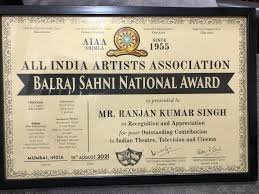
His autobiography, “Meri Filmi Aatmakatha,” and acclaimed travelogues like “Mera Pakistani Safarnama” and “Mera Rusi Safarnama” underline his versatility as a writer. The latter earned him the Soviet Land Nehru Award. With over 80 films, Sahni’s career journey of Balraj Sahni became synonymous with integrity and excellence.
Personal Challenges & Resilience
Balraj Sahni’s inspiring story is also woven with episodes of resilience. Losing his wife Damayanti at a young age left him grieving, yet he found strength to focus on his craft and later remarried writer Santosh Chandhok. Political activism occasionally landed him in trouble—he once spent time in jail due to protest involvement, which even delayed a film’s shoot. Through personal losses and professional hurdles, Sahni’s commitment to honest storytelling remained steadfast. He led the All India Youth Federation as its president—imbuing young people with hope and purpose.
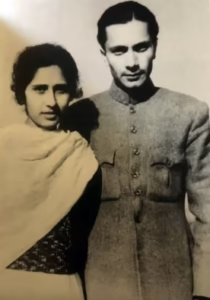
Human Side & Inspirational Takeaways
Apart from his professional accomplishments, Sahni’s warmth, curiosity, and humility rendered him unforgettable. He loved literature, penned poems, and traded stories. Lesser-known facts include his habit of observing people—he attributed his ability to “inhabit” characters to his keen study of real-life personalities. He was conversationally fluent in several languages and maintained an active political conscience, yet never lost his connection to ordinary people.

Befriending slum dwellers and spending time in their company, his empathy extended beyond the screen. Sahni’s life teaches that true success lies not merely in accolades, but in compassion, adaptability, and perseverance. His philosophy—that every struggle holds a lesson, and every setback is a stepping stone—continues to inspire anyone facing adversity.
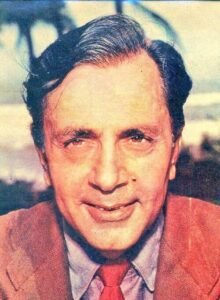
Balraj Sahni biography is a moving chronicle of artistic triumph over adversity. His journey—from Rawalpindi to Bollywood stardom—is marked by empathy, idealism, and an enduring commitment to telling honest stories. Through his work, words, and wisdom, Sahni represents the timeless potential for growth and transformation, promising that dreams pursued with sincerity can leave an everlasting mark.
Read More: https://curiousindian.in/bhushan-kumar-november-1977-present/


